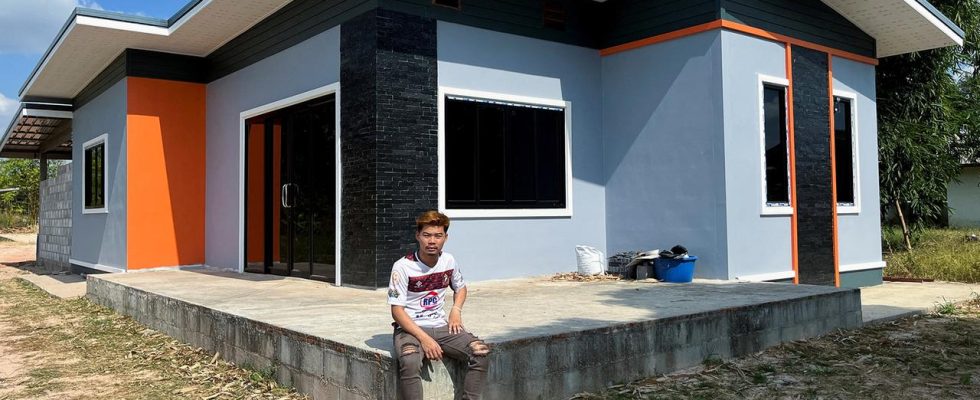The Thai Anucha Angkaew came to Israel as a harvest worker. He was kidnapped to the Gaza Strip by Hamas terrorists. He was released after 50 days. Now he reports about shots, beatings – and his future plans.
Anucha Angkaew draws the floor plan of a room on a piece of squared paper with a ballpoint pen. Here he was held hostage. “There was the door, someone from Hamas was standing outside. Here is the toilet,” the 28-year-old told the Reuters news agency.
When Hamas attacked on the morning of October 7th, he hid in a bunker with five other Thais. After an hour, they heard voices, went outside and found Israeli soldiers. Instead, they encountered ten armed Hamas terrorists. The men dressed in black took her with them. Two Thais shot them on the spot. One was a good friend of Angkaew.
The group was relocated three times
They were driven to Gaza in a pickup truck for 30 minutes. They spent four days there on the ground floor of an abandoned building. “They first took us to an abandoned house that looked like a warehouse,” says Anucha Angkaew. Before the Hamas terrorists tied his and the others’ hands behind their backs, they were checked to see if they had any weapons.
His wrists still show signs of the shackles. An 18-year-old Israeli sat next to the four Thais. Angkaew knew him from the kibbutz, where he worked on an avocado farm. After a few days, the group was put on a pickup truck. In total they changed locations three times. They were beaten. The Israeli particularly violent with cables.
A bottle of water for two hostages
Before they went down into the Hamas tunnel system, each of them was photographed, says Angkaew. “We didn’t speak for the first few days. The room we sat in wasn’t big. Maybe five by two feet.” They slept on sandy ground and were given flatbread twice a day and a bottle of water, which they had to share between the two of them.
If they wanted to go to the toilet, they were accompanied by one of the eight armed terrorists with a machine gun. They didn’t shower or brush their teeth. “Then we wouldn’t have had any water to drink,” explains the 28-year-old.
Chess pieces made from toothpaste packaging
He counted the days by meals. He scratched lines into the ground, one for each day. He ended up being held hostage by Hamas for 50 days. As they moved underground, they passed metal doors set into the tunnel wall at regular intervals.
Meanwhile, several Thai actors were negotiating above ground for the release of the hostages. Their prison grew larger. They could now sleep on plastic sheets and were given more food such as nuts, butter and rice. From then on they were no longer beaten.
A terrorist left a pen in their room with which they were supposed to write down their names and nationalities. They used it to paint tattoos and a chessboard on the white plastic sheet. They made the toy figures out of pink and green toothpaste packaging.
Two-hour walk through the tunnel
Angkaew and his fellow prisoners were unaware of the Israeli air strikes above. On the day they were released, a Hamas terrorist simply said: “Thais, you can go home.” An Israeli hostage helped translate. They then walked through tunnels for almost two hours. They were blindfolded, he says.
Then he and his fellow prisoners came to the surface, where Israeli women and children were already waiting. They were all handed over to the Red Cross together. “I wish they would stop fighting,” says Angkaew. He feels sorry for the Thais who, like him, went to Israel to work and knew nothing about the conflict.
Some want to work as harvest workers again
Around ten Thais are still in the hands of Hamas. Anucha Angkaew is now back with his wife and seven-year-old daughter. He runs through his modern house in his hometown of Udon Thani in northeast Thailand in a soccer ball jersey. He built it with the money he earned in Israel.
He wants to move in here with his family in a few weeks. The Thai government promises returnees money for a new start at home. But the Israeli government is offering more money and better shelters. She relies on harvest workers like Anucha Angkaew.
But he doesn’t want to go back, but some of his former fellow prisoners do.
Jennifer Johnston, ARD Singapore, tagesschau, December 12, 2023 9:00 a.m

